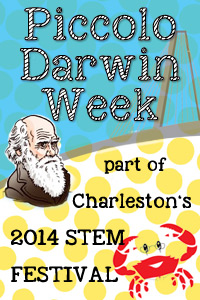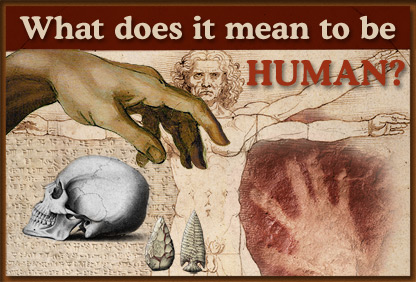Don’t
Miss — 
2014 Event Venues
The School of Science and Math Auditorium,
College of Charleston
Located at the intersection of Coming and Calhoun Streets, across from
the College Library. The NSCB (New Science Center Building) Auditorium
is Room 129.
Grimsley Hall, The Citadel
The Citadel’s Grimsley Hall is located at the north end of
Summerall Field, on Jenkins Avenue.
Maps of the CofC
Campus, and The Citadel are available online.
Circular
Congregational Church
Circular
Congregational Church is located at 150 Meeting Street.
The Church of the Holy Communion
The
Church of the Holy Communion is located at 218 Ashley Avenue.
PAST YEARS’
Darwin Week In Charleston, Since 2001
2001
Darwin Week
2002 Darwin Week
2003 Darwin Week
2004 Darwin Week
2005 Darwin Week
2006 Darwin Week
2007 Darwin Week
2008 Darwin Week
2009 Darwin Week
2010 Darwin Week
2011 Darwin Week
2012 Darwin Week
2013 Darwin Week
EVOLUTION
SUNDAY:
Living Religiously as a Naturalist
Sunday, February 9 at 11:00 a.m.
Rev. Dr. Jeremy Rutledge
Circular Congregational Church (150 Meeting St) is a progressive Christian congregation that embraces
the natural and social sciences as partners in the search for truth and
meaning. Rev. Rutledge’s sermon will consider religion from
the
point of view of a naturalist, finding reverence, wonder, and awe close
at hand. Drawing on Darwin’s insights and the diversity of
our
Lowcountry home, perhaps we might find our way to a deeper humanity
through connection with the myriad forms of life.
The Rev. Dr. Jeremy Rutledge is senior minister at
Circular Congregational Church (UCC) downtown. He studied at
Baylor University, the Baptist Theological Seminary at Richmond, and
Meadville Lombard Theological School in Chicago, where his doctoral
work focused on religious naturalism. Rev. Rutledge is a longtime
member of the Institute on Religion in an Age of Science. Before
coming to Charleston, he was senior minister at Covenant Church in
Houston for ten years.
Search for Other Worlds
Monday, February 10 at 4:00 p.m.
CofC School of Sciences and Math Auditorium
Dr. Joe Carson
How common is life in the universe? How many foreign worlds
exist
that could support life? In the last decade, astronomers have
discovered foreign planets in large enough number, and in great enough
variety, that scientists can now make meaningful statements on the
frequency of foreign planets that could support life. Dr.
Carson
reviews the current knowledge of such planet populations, as well as
the history of such searches. He also discusses future search
programs, expected in the next few decades, that astronomers believe
will be able to probe extrasolar planets for signatures of life.
Reception to follow.
››
Sponsored by the CofC Department
of Physics & Astronomy
Dr.
Joe Carson is
an Assistant Professor in the Department of Physics & Astronomy
at
the College of Charleston. As a part of several international
search teams, he and his research students carry out direct imaging
explorations for extrasolar planets. He led the team that
made
the recent discovery of the most massive star known to host an
extrasolar planet.
“Light will be thrown on the origin...”
What Have We Learned About
Human Evolution Since Darwin?
Tuesday, February 11 at 4:00 p.m.
CofC School of Sciences and Math Auditorium
Dr. Rick Potts
When Darwin died in 1882, very little was known about heredity, Earth’s
age, the kinship among species, and the fossil record of humans and
most other organisms. Any of these uncertainties could have hurt or
demolished his concept of evolution. Yet across the sciences, there is
overwhelming evidence of how organisms have changed and adapted to
environments, the relatedness of all organisms, and the origin and
extinction of species over vast reaches of time. Changes in genes,
anatomy, behavior, species diversity, and environments are beautifully
illustrated by the study of human evolution. New developments in
paleoanthropology concerning how human characteristics accumulated over
time and the origin of adaptability continue to magnify our
understanding about ourselves as part of the history of life.
Reception to follow.
››
Sponsored by a Howard Hughes Medical Institute grant for science
education.
Paleoanthropologist Dr. Rick Potts
is the director of the Smithsonian’s Human Origins Program and curator
of anthropology at the National Museum of Natural History. He has
dedicated his research to piecing together the record of Earth’s
environmental change and human adaptation. Rick leads ongoing
excavations in the East African Rift Valley at fossil and archeological
sites in southern Kenya and on the shores of Lake Victoria. He is
curator of The David H. Koch Hall of Human Origins, and wrote the
companion book for the current exhibit "What Does It Mean To Be Human?"
Darwin Fulfilled:
Transitional Fossil Whales from Charleston, South Carolina
Wednesday,
February 12 at 1:00 p.m.
CofC School of Sciences and Math Auditorium
Dr. Jonathan Geisler
Darwin built his case for evolution with living species and felt
compelled to explain why fossils of transitional species were so rare.
What a different case he would make today! Paleontologists have since
found a dizzying array of transitional forms, including numerous fossil
whales. Although the transition from walking to swimming whales is now
well understood, it is still unclear how whales evolved their unique
adaptations for breathing, feeding, and hearing underwater. Dr. Geisler
will describe exquisitely preserved fossil whales from the Charleston area
that help fill these gaps in our knowledge.
Reception to follow.
›› Sponsored by the CofC Department of Geology and Environmental
Geosciences.
Dr. Jonathan Geisler is Associate Professor of Anatomy at the New York Institute of
Technology (Old Westbury) and Research Associate at
the National Museum of Natural History. He received bachelor’s
degrees in geology and biology from the College of Charleston and his
Ph.D. from Columbia University. He is an expert on the evolution
of the Cetacea, emphasizing insights obtained by integrating
observations from living and fossil species. He has collected and
studied fossil whales of the Charleston area for over 15 years.
Presented
with the Christian-Jewish Council —
What Does It Mean To Be Human?
An Interfaith Conversation
on Science, Religion and Being Human
Wednesday, February 12 at 7:00 p.m.
Church of the Holy Communion, 218 Ashley Ave.
Moderated by Rev. Dr. James B. Miller
The last hundred years have exhibited an extraordinary increase in our
understanding of the natural history of the origin and development of
humankind over the past 6 million years. The three Abrahamic
religions (Judaism, Christianity, Islam) have traditionally identified
humankind as "made in the image and likeness of God." This interfaith
conversation will explore how these religious communities assess our
ever increasing scientific understanding of human origins, historical
development and ecological impact.
Reception to follow.
››Sponsored by the Church of the Holy Communion, the Charleston Atlantic Presbytery (PCUSA), the Christian-Jewish Council of Greater
Charleston, and the Howard Hughes Medical Institute.
Dr. Rick Potts
is Director of the Smithsonian’s Human Origins Project (more above).
Rev. Dr. James Sawers is a Ph.D. physicist and retired
United Methodist minister.
Rev. Joseph Darby is Presiding Elder of the Beaufort District AME
Church.
Rev. Jeffrey F. Kirby, STL, is Moral Theologian for the Diocese of Charleston.
Rabbi Anthony D. Holz is Rabbi Emeritus of Kahal Kadosh Beth Elohim Reformed Synagogue.
Neuroscience and the Spirit:
Has Science Proven the Existence
of God?
Thursday, February 13 at 4:00 p.m.
CofC School of Sciences and Math Auditorium
Dr. Paul D. Simmons
The findings that religious impulses are related to chemical
activity in the brain has raised the intriguing question as to whether
people are hard-wired for belief in God. The issue for religion is
whether brain activity is proof of divine activity in human life. Might
God be the subject of scientific research after all? These
and
other questions will be posed in the light of new breakthroughs in
brain imaging. Dr. Simmons will bring illustrations
from
science and religion that pose profound questions for an easy reliance
on such studies.
Reception to follow.
››
Sponsored by the Charleston Chapter of Sigma Xi.
Intelligent Design:
Is This the End of Evolution?
Thursday, February 13th at 6:30 p.m.
117 Grimsley Hall, The Citadel
Dr. Paul D. Simmons
Intelligent Design claims to rival or displace the theory of
evolution but Dr. Paul Simmons will argue it is both bad
theology
and bad science. It has no credible standing as science and appeals to
terribly problematic notions such as "irreducible complexity." It also
appeals to religious piety as believing the unprovable and improbable.
Simmons will argue that there are major deficits in
ID that
make it incredible that it would ever be taught in a classroom for
science.
Refreshments preceding in Room 204.
Dr. Paul D. Simmons
is a Clinical Professor at the University of Louisville School of
Medicine, specializing in medical ethics. He is also
an ordained Baptist Minister, with 25 years of experience
serving
pulpits throughout the South. He has served as
Acting Dean
of the School of Theology and Chair of the Graduate Studies Committee at
The Southern Baptist Theological Seminary.

